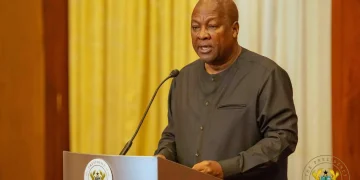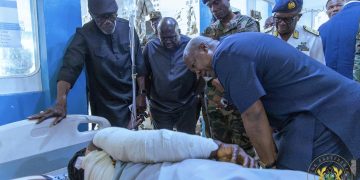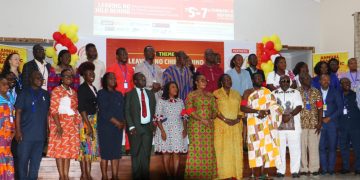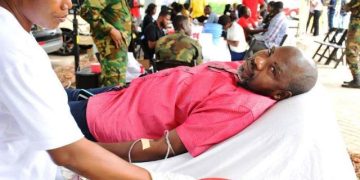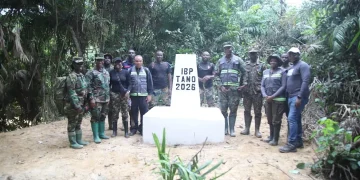A three-member panel of the Court of Appeal has acquitted and discharged the Assemblyman for Dankyira Obuasi, William Baah, who was convicted and sentenced to life imprisonment for abetting the death of military officer Major Maxwell Adams Mahama.
This was after the panel chaired by Justice Christopher Archer unanimously held that the weight of evidence fell below the standard threshold to secure his conviction.
The Court held that testimonies of other accused persons and Prosecution Witnesses did not lead sufficient evidence to show that the Appellant (William Baah) was the abetter of the crime.
The Court said the evidence on record showed that the Court’s reasonable inference is that the lynching of Major Mahama had begun before the Appellant returned to the scene.
The panel, which also includes Justices Dr. Justice Ernest Owusu-Dapaa and David Kwabena Adade Boafo, also held that the evidence falls far within the threshold to secure conviction.
While condemning the act which led to the death of the military officer, the court said justice is to be served dispassionately.
While the Presiding Judge, Justice Archer read the judgment of the Court, Justice Owusu-Dapaa also delivered a concurrent opinion.
EIB Network’s Legal Affairs Correspondent, Murtala Inusah, who was in Court, reports that while William Baah broke down in tears, his lawyer George Bernard Shaw was emotionally stricken as he addressed the court, reflecting on the challenges the case has brought to him.
Convicted William Baah, per his grounds of Appeal, contended that the facts at the trial did not support the weight of evidence to secure conviction.
He also argued that the trial judge erred in law by dismissing his submission of no case application.
It is the case of the appellant that there was no evidence at trial that William Baah committed any of the relevant acts that constitute abetment.
The appellant also contended that the trial judge erred in law in directing the jury as to the intention of abetment.
He also submitted that the jury verdict was unsafe as there was no evidence of the accused committing any of the relevant acts.
What is abetment?
An abetment as a crime is captured in Section 20(1)(2) and its related provisions of the Criminal Offences Act, 1960 (Act 29) of Ghana.
The provision is as follows:
(1) A person abets the commission of an offence who—(a) directly or indirectly instigates, commands, counsels, or procures another person to commit the offence; or
(b) aids or facilitates the commission of the offence by the principal offender; or
(c) intentionally omits to do an act which it is his or her legal duty to do, and which omission facilitates the commission of the offence.
(2) A person who abets an offence is liable to be punished as a principal offender, unless the context otherwise requires.
Background
On January 29, 2024, the High Court in Accra sentenced William Baah, the Assemblyman of Denkyira-Obuasi and 11 others into life imprisonment after they were found guilty for their respective roles in the lynching to death of military officer Major Maxwell Mahama.
A seven-member jury comprising of a lady and six gentlemen had returned a unanimous guilty verdict against William Baah for abetment.
The Eleven others – Bernard Asamoah alias Daddy, Kofi Nyame a.k.a Abortion, Akwasi Boah, Kwame Tuffour, Joseph Appiah Kubi, Michael Anim, John Bosie, Akwasi Asante, Charles Kwaning, Emmanuel Baidoo, and Kwadwo Anima were also unanimously found guilty for conspiracy.
The Jury also returned a unanimous guilty verdict against eight of them- Bernard Asamoah, alias Daddy, Kofi Nyame a.k.a Abortion, Charles Kwaning a.k.a Akwasi Boah, Kwame Tuffour, Joseph Appiah Kubi, Michael Anim, Akwasi Asante and Charles Kwaning for the charge of murder.
After sentencing them to life imprisonment, Justice Mariama Owusu, a Justice of the Supreme Court sitting with additional responsibility as a High Court judge, said, the punishment for both conspiracy and the murder are to run concurrently.
Two others – Bismarck Donkor (A8) and Bismark Abanga (A13) who were charged for conspiracy have been acquitted and discharged after the jury returned a unanimous not guilty verdict in their favour.
Reaction
On that day, the mother of the late Major Mahama punched the air in satisfaction after Justice Owusu imposed the life sentence on them as prescribed by law.
Other family members of the late soldier cladded in black outfit (some) with red armbands including the mother, father and siblings of the late young soldier were all present in an emotionally-tensed court session.
Brief facts
The facts, presented by the prosecution, were that Major Mahama was the commander of a military detachment stationed at Diaso in the Upper Denkyira West District in the Central Region to check illegal mining activities.
At 8 am on May 29, 2017, Major Mahama, wearing civilian clothes but with his sidearm, left his detachment base for a 20-kilometre jogging.
At 9:25 a.m., the military officer got to the outskirts of Denkyira Obuasi, where a number of women were selling foodstuffs by the roadside.
He stopped to interact with the women and even bought some snails, which he left in their custody to be taken up on his return from jogging.
While he was taking out money from his pocket to pay for the snails, the woman from whom he had bought the snails and a few others saw his sidearm tucked to his waist.
Soon after he left, one of the women telephoned the assembly member for Denkyira Obuasi to report what they had seen.
“Without verifying the information, the assembly member mobilised the accused persons and others, some now at large, to attack the military officer,” the prosecution stated.
It added that the mob met Major Mahama near the Denkyira Obuasi cemetery and, without giving him the opportunity to explain and identify himself, “attacked him with implements such as clubs, cement blocks and machetes, killed him and burnt a portion of his body”.
Source: www.kumasimail.com



